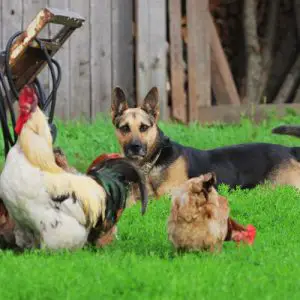Is your dog struggling with itchiness or a chronically upset gut? Or has your vet recommended exploring novel protein diets to tackle food allergies? It’s never nice to see your dog chronically uncomfortable. But there’s good news. If your dog’s symptoms are related to food allergies, they could be easily fixed by a change in their diet.
The world of dog food is extensive and finding the right one for your dog can be overwhelming. In this article, we will tackle some of the most common questions about novel protein diets: Why might your dog need it? What is a food allergy? How do you perform a food trial? And most importantly, what proteins or wording on the packaging should you be on the lookout for?
Summary
- Your own dog’s list of novel proteins is unique to them, and dependant on what proteins they have consumed in the past.
- The most common novel proteins are turkey, duck, venison, rabbit, or ostrich.
- Your dog may need a novel protein diet if they have a food allergy or underlying immune disease such as inflammatory bowel disease.
- To diagnose a food allergy, a six-week food trial is needed, in which your dog can only eat the specific food used for the trial.
- If you’re concerned that your dog may have a food allergy or you want to feed your dog a novel protein diet, first talk to your vet for advice on what diet is best suited for them.
What is a novel protein?
Novel means new, and therefore, a novel protein is a protein which your dog has never consumed before. The terminology is often confused with “exotic” or “hypoallergenic” and these terms are often used interchangeably, however they don’t quite mean the same thing.
A novel protein will be unique to your dog and dependent upon the diet you have fed in the past. Whereas a hypoallergenic protein on the other hand, is a protein which is commonly novel to the average dog, and an exotic protein is a less commonly used protein in dog food, but not necessarily marketed to dogs who need novel proteins.
When does a dog need a novel protein diet?
Dogs only need a novel protein diet if they react to the protein in their current diet. This is most commonly because of a food allergy, but other health concerns may also require a novel protein diet, such as inflammatory bowel disease (IBD).
If your dog doesn’t have a health issue, there are no increased benefits for buying a novel protein diet. It’s a common misconception that feeding your dog a diet which is marketed as novel, exotic or hypoallergenic will prevent allergies. In fact, it might even reduce the list of potential foods you can feed if your dog does develop allergies.
What is a food allergy?
A food allergy is when the body’s immune system reacts to an allergen, which is a tiny part of the protein which the immune system recognises as either safe or a threat. An allergen most commonly an animal protein, but can also be an animal product protein, such as dairy, or plant-based food, such as wheat and soy.
When the body encounters an allergen which it deems a threat, it triggers mast cells to release histamine and other inflammatory messengers. Mast cells are common in the skin and the guts, which is why allergies can lead to symptoms such as itchy skin, inflamed ear canals and diarrhoea.
It’s important to note, a food allergy is an immune reaction and therefore different to a food intolerance, which is when the body struggles to digest an ingredient. The terminologies are often confused.
Pathogenesis
There is still much unknown about food allergies, but in dogs, there certainly seems to be breed predispositions. German Shepherds, Labrador Retrievers, French bulldogs, and West Highland White Terriers are overrepresented. As a result, a genetic cause is generally assumed.
Allergies tend to arise in young adulthood (1-3 years old) and do not appear to be associated with gender. The true prevalence of food allergies is unknown, but according to Merck Veterinary Manual, some studies have indicated up to 40% of dogs presented at the vets for itching have some form of food allergy.
Common allergens
The most common food allergens in dogs are beef, dairy products, chicken, wheat and lamb, however other common food sources are occasionally implicated, such as soy, corn, egg, pork, fish and rice.
Unsurprisingly, these are the most common ingredients in commercial pet foods and represent what most dogs will have been exposed to in their young adulthood years.
Diagnosis
Underpinning the reason for a food allergy is important, as some ingredients can be avoided resulting in an easy solution to easing your dog’s symptoms. To diagnose a food allergy, all other causes of itching will need to be first ruled out by a veterinarian (such as parasites, infections, and environmental allergies). Once narrowed down, a food elimination trial aids in confirming the diagnosis.
How to do a food trial
Before starting a food trial with your dog, it’s important to speak to your veterinarian. They probably will be the one who has recommended it, but if your dog has any other underlying health concerns, such as urinary or liver ailments, a change in their diet may be detrimental to them.
A food trial is when you feed your dog a specific diet for at least six weeks, while documenting their symptoms. It’s important to only feed this food. Treats, table scraps, or a dead rabbit which your dog found on a walk all contain other proteins, rendering the trial useless.
Elimination trial versus hydrolysed protein trial
There are two types of food trials which can be performed. The first is with a novel protein diet. This is known as an elimination trial. Any protein which your dog has consumed in the past cannot be in the food, which is why the diet is often formulated with limited ingredients or just a single protein source. However, the results of an elimination trial cannot always be trusted if a good quality product hasn’t been used, as at least one study has suggested that novel protein diets, particularly over-the-counter products, can be frequently contaminated with proteins such as soy, poultry or beef.
Another option is a hydrolysed protein trial. Hydrolysed protein diets are where the antigens on the proteins have been hydrolysed so they are no longer recognisable to the body. This means the immune system does not react to them.
Commercial or homemade?
Since it is not always easy to find a novel protein diet which is suited to your dog’s individual needs, some owners explore homemade diets. While this brings with it the benefit of knowing exactly what is in the food, it is often difficult to nutritionally balance a limited ingredient homemade diet and therefore it should always be formulated by a registered veterinary nutritionist. On the other hand, commercial novel or hydrolysed protein diets must meet certain criteria to allow them to be sold to consumers, so you can rest assured these are appropriately nutritionally balanced.
Choosing the right food
Choosing a food can be overwhelming, as there are many choices of food marketing themselves as novel, exotic, hypoallergenic or hydrolysed protein diets. However, when performing a food trial, it is important to choose a diet which is of a very high quality and where the company invests money into research and development of their diets for dogs with food allergies. A prescription diet from your veterinarian is a good place to start, and after the six-week trial, individual ingredients can be slowly added back in, to develop a list of foods which your dog doesn’t react to.
FAQs
A novel protein diet is a diet which contains proteins that your dog has never consumed before.
For some dogs, fish will be a novel protein. However, it is also a protein which is relatively common in dog foods and one which has been known to be implicated in food allergies.
There is no “best” protein for dogs with allergies, as each dog is unique in what they react to. However, the most common proteins used in novel protein diets are turkey, duck, venison, rabbit, or ostrich.
Hydrolysed proteins are just as nutritious as non-hydrolysed proteins, and do not have any health implications for your dog.
Bison is sometimes considered a novel or exotic protein; however, it is becoming more popular as a mainstream ingredient, particularly in North American developed dog foods. While it a great animal protein source, it’s important to note that with Bison (or any exotic wild animal protein), supply can be seasonal, leading to shortages. In addition to that, less information is available about nutrient levels of exotic proteins compared to commodity proteins, potentially leading to nutritional issues if the manufacturer does not invest in testing the ingredients and finished diets.
Turkey is commonly considered a novel protein; however, your dog’s list of novel proteins is unique to them and therefore if your dog has eaten turkey before, it will not be a novel protein.
Novel proteins are commonly more exotic, which means they might be free-range and wild-caught. In some circumstances this is environmentally friendlier, and potentially more ethical for the animal’s welfare. Nevertheless, it’s important to check the food manufacturer’s claims and affiliations to ensure the food is sustainable.
Hypoallergenic proteins are proteins which are less commonly found in dog foods, and therefore less likely to cause an immune reaction in the average dog. Hydrolysed proteins are proteins which have been stripped of their antigens to ensure the immune system does not recognise them as a foreign threat.
Novel protein dog food can be purchased at most veterinary practices, online veterinary pharmacies, and large pet store chains. In some countries, veterinary diets may need a prescription from your vet to be purchased, however in the UK this is not required.
Written by Dr Jo de Klerk, BVetMed (Hons) MScTAH MRCVS. Jo is a graduate of the Royal Veterinary College, London. She is a published author of several books and has two dogs: a slightly nutty Springer Spaniel and a loving little Yorkshire Terrier.




